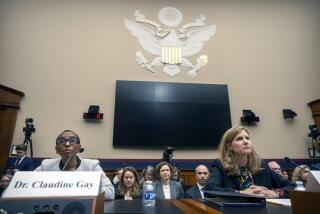Modern-Day Racism Masks Its Ugly Head
- Share via
There are those who assert that racism is obsolete and not a contemporary problem. But racism is a current event; only its expression is more disguised and subtle. And it requires intervention.
We can best understand the contemporary reality of racism by delving into its past. In antiquity, knowledge of racial differentiation was not necessarily accompanied by dehumanizing sentiments; indeed, the ancient Greeks and Romans looked upon the ancient Ethiopians with respect and romanticism. The ancient Egyptians’ awareness of racial variation did not carry with it the dehumanization of those who were superficially different.
The idea of race took on the patina of a scientific enterprise primarily in the early to mid-1800s, as part of what is largely known as the European Enlightenment. Scientists at that time, particularly in biology and botany, were earnest in classifying the diversity of life on Earth, and part of this classification included the human species. Perhaps because of ethnocentrism and cultural chauvinism, the classification of human beings included a rank ordering with Europeans at the top of the scale and Africans at the bottom.
The institutionalization of slavery within the Americas required an intellectual justification for the mistreatment of millions of African men, women and children. Muslims had mirrored this process of intellectually justifying enslavement in the earlier enslavement of East Africans. Slavery required racism and was the proximate cause of it.
Racism became unique in the United States largely because of the efforts to abolish slavery. These efforts intensified the efforts of slavery’s apologists to justify their “peculiar institution.” Thus if we can say that contemporary racism is a product of American slavery, then we must also accept the premise that American slavery demonstrates other consequences that are as alive and well today as is racism.
Racism in contemporary world affairs is disguised, and it is what some refer to as symbolic racism, modern racism or aversive racism. These eschew the old-fashioned, redneck ideology of white supremacy and black inferiority and instead espouse support for the ideals of equality in human affairs. Yet these ideals of equality are discordant with the preference for the status quo of white privilege.
Thus aversive racism is manifested in opposition to programs and policies that seek to undo white privilege or provide advantages to blacks on the basis of historical discrimination. Interestingly, contemporary research in social psychology demonstrates that the aversive racist is unaware of his or her racism; much of contemporary racism is an unconscious process.
In a series of interesting experiments, some in the laboratory and some in real-world settings, social psychologists have illustrated the presence of unconscious or aversive racism in a number of contexts. The effects of aversive racism are manifold and affect the quality of life of Africans and African Americans both physically and psychologically. Thus we see the ravages of racism at work in the appalling statistics of HIV/AIDS in Africa and among African Americans. We see the life-and-death consequences of old-fashioned and modern racism in the rates of infant mortality among Africans and African Americans as well as their much higher rates of preventable deaths from hypertension, heart disease, cancer and violence.
The current effects of racism have led to a widening of the economic gulf between white Americans and black Americans. Although the proportions of African Americans in the middle and upper classes have increased, so too has the proportion of African American children reared in poverty. The presence of African Americans in the higher echelons of corporate America, government and the military is about one-tenth of what one would expect given a system of true equal opportunity.
To solve these problems of structured inequality, we must first acknowledge the reality of racism in contemporary world affairs. We can no longer afford to hide from this reality. We must make conscious unconscious racism. Then we must develop and propagate social and institutional norms and values that reject racism--conscious and unconscious--and advance true equal opportunity.






